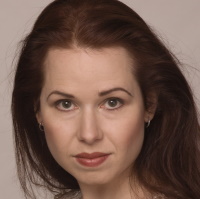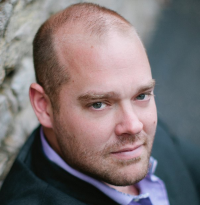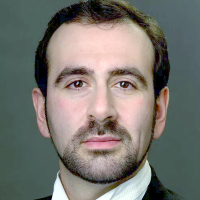Jubilation
Saturday, October 9, 2021 • 7:30 p.m.
First Free Methodist Church (3200 3rd Ave W)
Harmonia Orchestra & Chorus
William White, conductor
Tess Altiveros, soprano
Sarah Mattox, mezzo-soprano
Brendan Tuohy, tenor
Anton Belov, baritone
Program
Quinn Mason (*1996)
Toast of the Town: Overture for Orchestra
Antonín Dvořák (1841 –1904)
Žalm 149, Op. 79
William C. White (*1983)
Psalm 46, Op. 14
Glory to God
— intermission —
Johann Strauss II (1825–1899)
Overture to Die Fledermaus
Giuseppe Verdi (1813–1901)
“Libiamo ne’ lieti calici” (Drinking Song) from La Traviata
Georges Bizet (1838–1875)
“Seguidilla” from Carmen
Charles Gounod (1818–1893)
“Ah, je ris de me voir” (Jewel Song) from Faust
Engelbert Humperdinck (1854–1921)
“Der kleine Sandmann bin ich” (Sandman’s Aria) and
“Abendsegen” (Evening Prayer) from Hänsel und Gretel
Gioachino Rossini (1792–1868)
“Se inclinassi a prender moglie” from L'Italiana in Algeri
Wolfgang Amadè Mozart (1756–1791)
“Non più andrai” from Le nozze di Figaro
“Soave sia il vento” from Così fan tutte
Amy Beach (1867–1944)
Bal Masqué, Op. 22
Giacomo Puccini (1858–1924)
“Coro a bocca chiusa” (Humming Chorus) from Madama Butterfly
Leonard Bernstein (1918 –1990)
“Make Our Garden Grow” from Candide
About the Concert
A concert of light music and high spirits: join us for our return to the stage as we present a brilliant program of choruses, arias and overtures!
About the Soloists

Soprano Tess Altiveros, praised by the Los Angeles Times for her “particularly soulful” interpretations and by the Pioneer Press for a “captivating combination of skilled singing and magnetic acting,” is equally at home in repertoire from the 17th century to the 21st. Her recent portrayal of Female Soldier in Seattle Opera’s The Falling and the Rising was described as “a triumph” (Classical Voice North America) and “enthralling” (The Seattle Times). She has performed with Kentucky Opera, Pacific Symphony, Pacific MusicWorks, Inland Northwest Opera, Central City Opera, Boulder Philharmonic, Colorado Symphony, Juneau Lyric Opera and Eugene Opera. Recent virtual performances include Gianetta in L’Elisir d’Amore for Seattle Opera and the role of Rockstar in Resonance Work & Decameron Opera Coalition’s Tales from a Safe Distance (described by The Wall Street Journal as “ingenious”). Upcoming engagements include Le Nozze di Figaro (Intermountain Opera), Eugene Onegin (Skylark Opera Theatre), the world premiere of Romeo (Orpheus Project), and appearances with Evansville Philharmonic, Opera on the Lake, Symphony Tacoma, Great Bend Center for Music and a recital of new music with the Aria Institute in Paris.
- Learn more: tessaltiveros.com

Mezzo-soprano Sarah Mattox has sung principal roles with Seattle Opera, Cincinnati Opera, Palm Beach Opera, Chicago Opera Theatre, Lyric Opera Cleveland, Amarillo Opera, Eugene Opera, Tacoma Opera and many others. Favorite roles include the title characters in Carmen and Cendrillon, Dorabella in Così fan Tutte, Ottavia in L’Incoronazione di Poppea and the Witch in Hansel and Gretel. She received special acclaim from The Seattle Times for her debut as Feodor in Seattle Opera’s Boris Godunov: “newcomer Sarah Elouise Mattox … raised eyebrows all over the Opera House with her believable, lifelike acting and her well-schooled voice.” In Cleveland, the Beacon Journal called her “a rich-toned mezzo-soprano who came to life as Dorabella.” Also at home on the concert stage, Ms. Mattox has made several appearances at Benaroya Hall with the Seattle Symphony. She has also been a soloist with the Northwest Sinfonietta, Cascade Festival of Music, Seattle Baroque Orchestra, Portland Baroque Orchestra, Helena Symphony, Bainbridge Symphony, Pacific Northwest Ballet, the Walla Walla Symphony, Portland Chamber Orchestra, Eugene Concert Choir and Harmonia. As a composer, Ms. Mattox was won awards for her chamber opera Heart Mountain and her song cycle Rumpelstiltskin and the Falcon King.
Learn more: sarahmattox.com

Tenor Brendan Tuohy has been praised by The Cincinnati Post for his “big, bold tenor edged with silver,” and he continues to move audiences both in the U.S. and overseas. Recent appearances include Nemorino in L’elisir d’amore with Tacoma Opera, David Lang’s The Little Match Girl Passion with Eugene Opera, and the role of Rent-a-Cop in the world premiere of Evan Mack’s Yeltsin in Texas. In 2018 he returned to the Grant Park Music Festival to sing Haydn’s Theresienmesse, following a 2017 performance of Beethoven’s Ninth. Other engagements have included Rachel Portman’s The Little Prince with Opera Theater Oregon, Haydn’s The Seasons and Handel’s Messiah with Harmonia, Britten’s War Requiem at the University of Washington, and the iSing International Music Festival in Suzhou, China. He has performed on the opera stage at Eugene Opera, City Opera Bellevue, Vashon Opera and Berlin Opera Academy, and in concert with the Oregon Symphony, Seattle Symphony, Pacific MusicWorks and Symphony Tacoma. Mr. Tuohy completed his academic training at the University of Cincinnati College-Conservatory of Music with a master’s degree in vocal performance. In 2008, he had the honor of singing and competing in the Metropolitan Opera National Council Semi-Finals in New York City.
- Learn more: brendan-tuohy.com

The voice of baritone Anton Belov has been called rich and mellifluous by The New York Times, while The Philadelphia Inquirer deemed it that of an emerging star. A native of Russia and a graduate of the Juilliard Opera Center, he has appeared throughout the United States and has earned critical acclaim for his portrayals of characters as diverse as Count di Luna, Don Giovanni, Escamillo, Count Almaviva, Doctor Malatesta and Eugene Onegin. Equally at home with opera, oratorio and concert repertoire, Mr. Belov has presented over 100 recitals throughout the United States, appearing at such venues as the Kennedy Center. Highlights of his concert career include Rachmaninov’s The Bells at Boston’s Symphony Hall, Handel’s Messiah at Avery Fischer Hall, Brahms’ German Requiem at Benaroya Hall, and Weill’s Seven Deadly Sins with the Detroit Symphony at Carnegie Hall. He is a first-place winner of eight vocal competitions, including the George London Competition, Young Concert Artists International Competition and Metropolitan Opera National Council Auditions. A specialist in Russian lyric diction, he is the author of numerous books on the subject and is an associate professor of music at Linfield College.
- Learn more: antonbelov.com
Maestro’s Prelude
Gentle Listeners,
Tonight, I encourage you to leave behind most, all — or at least some of — the cares of the world. Our program is meant to delight and enchant, with pieces that are bubbly, bouncy and uplifting, and I hope that this evening can serve as a balm for the weariness that has laded all our souls these past several months. Our 2021–2022 season is called “Renewal,” and this is the first step in that process.
Many of the selections on tonight’s program might be classified as “light music,” a category that sometimes gets short shrift in the classical-music industry these days, but I want to stand up for it. I am powerless to resist its charms, and I have a suspicion you might feel the same.
“Light” music is more than pure froth — there’s real substance beneath the bubbles. Even works as simple as Puccini’s “Humming Chorus” or Mozart’s trio from Così offer a profundity rarely matched in the more overtly serious works of the canon. In fact, I think you’ll find something soul-stirring beneath the obvious surface delights of all the music you’ll experience this evening.
We tend to associate light music with a certain musical era — the mid-19th century to be precise — and indeed, we have a healthy dose of Verdi, Gounod and Johann Strauss II in store for you. But some composers are still writing music that fits comfortably in the light-music genre even today.
Quinn Mason is a name that might ring a bell for those of you who were at our last “mainstage” concert on February 15, 2020. At just 25 years old, he’s as bright a light as we have in the world of classical music today, and I knew from the moment I saw the score of his Toast of the Town that it would be the perfect piece to open our season.
I always say that Harmonia’s offerings are “music concerts for music lovers” and I don’t think that’s ever been more true than tonight. I am intensely proud of our organization for finding a way to make music again and I am so thankful to live in a community that prioritizes both public health and the public expression of great art.
Cheers!
— William White
P.S. The next step on our journey of “Renewal” is coming up on November 6: a performance of Brahms’ poignant A German Requiem. While tonight’s program is meant to amuse and divert you, I look forward to sharing together in this monument to the human spirit.
P.P.S. I would strongly suggest that anyone interested in attending our performances of Messiah get tickets ASAP. As far as we can tell, Harmonia is going to be the only ensemble offering Messiah in Seattle this holiday season, so demand is likely to be higher than any time in recent memory. Of course, the easiest way to ensure that you have tickets to Messiah and any of our other performances is to subscribe. (Also a great way to save money off individual ticket prices!
Program Notes
Since conducting Orchestra Seattle (now the Harmonia Orchestra) in the world premiere of A Joyous Trilogy in February 2020, composer Quinn Mason has been very much a young star on the rise, in spite of the pandemic-driven decline in concertizing over the past 20 months. A Joyous Trilogy has subsequently been played by Italy’s Orchestra Sinfonica Nazionale della RAI and this season will see performances by the Utah, Mesquite, Amarillo Symphony and South Bend Symphonies, plus the Houston Ballet, to name but a few. The Houston Symphony commissioned and premiered his 2020 work Reflection on a Memorial for string orchestra, which has also been performed by the San Francisco Symphony and numerous other ensembles. In Memory for solo viola, commissioned by Harmonia, has been performed more than 100 times since its May 2020 YouTube premiere by Harmonia principal violist Grant Hanner.
Mason describes Toast of the Town as “a festive and fun overture to an operetta that doesn’t exist. It is designed in the style of light operetta, comparable to Gilbert and Sullivan or Offenbach.” Begun in 2016 and completed last year, the work had its “virtual” premiere by the Nevada All State Orchestra in April 2021 and a first live presentation by the National Orchestral Institute Philharmonic on June 20, followed by performances from the Utah Symphony and the National Youth Orchestra of the United States.
Famed Czech composer Antonín Dvořák set Psalm 149 for male chorus and orchestra between January 13 and February 24, 1879, premiering it in Prague on March 16 of that year and revising it in 1887 for SATB chorus and orchestra (the version heard this evening). “The joyful music only expresses the general mood of the text,” notes John Guthmiller, who concludes that “specific examples of tone painting or of a closer relationship between word and music are not to be found. We hear reminiscences of Walküre and Meistersinger as well as powerful Handelian interjections. … Equally interesting are the moments of choral recitative and the momentary flashes of Mendelssohn and Mozart. This is a cosmopolitan piece which is not intended to have traces of the nationalism for which Dvořák is so famous. Yet both the opening strains of the chorus and the closing of the work bear an unmistakably Bohemian character.”
Harmonia music director William White composed his setting of Psalm 46 for brass, organ and chorus in 2011 and conducted the premiere in May of that year. In 2018 he rescored the accompaniment for full orchestra (heard for the first time at this concert). About Psalm 46 he says:
“I wrote this piece on a commission from the Union Church of Hinsdale, Illinois, to celebrate the retirement of their longtime director of music (and my one-time boss), Michael Surratt. Mike is a great guy and a really great organist, so I wanted to give him something to bite into. The church suggested I set the text of Psalm 46 (one of Mike’s favorites) and I seized the opportunity to use a translation that has fascinated me for years, namely Young’s Literal Translation of 1862. What makes this version of the bible so truly unique is that Mr. Young, a self-educated Scotsman, translated from the Ancient Hebrew, Aramaic and Greek without rendering said languages grammatically into modern English. Strangely, though, he still uses the vocabularic style and tense endings of the King James Version, lending the text a very distinct flavor of the ancient and the modern. I made just a few tiny adjustments to this text, mainly for musical purposes, and also because of Mike’s aversion to the use of the masculine pronoun for God.
“Astute listeners may recognize two hymn tunes quoted extensively (and often hidden) in the piece: ‘A Mighty Fortress Is Our God’ and ‘O God, Our Help in Ages Past’ — both are paraphrases of the Psalm 46 text and favorites of Mike’s.” The work unfolds in three “movements” played without pause, capped by a very brief coda that represents the work’s dedicatee scampering into retirement.
Setting the traditional text for Christmas Eve, Glory to God! received its premiere at about 11:30 p.m. on December 24, 2006. Originally composed for chorus, organ, brass and percussion, White re-scored it for chorus and full orchestra for the occasion of a virtual performance by Harmonia musicians released on YouTube in December 2020 as a musical Christmas card.
Famed as the “Waltz King,” Johann Strauss II also wrote 16 operettas, the third of which (and most famous by far) is Die Fledermaus (“The Bat”). Premiering at Vienna’s Theater an der Wien on April 5, 1874, it soon became ensconced in the repertory of nearly every major opera house across the Western world, and its overture — which samples from the operetta’s many delightful arias and dance numbers, including a two-step, a waltz and a polka — has become a concert favorite, in particular at the Vienna Philharmonic’s New Year concerts.
The renowned Italian composer Giuseppe Verdi adapted his 1853 opera La traviata from a stage version of the 1848 novel La Dame aux Camélias (known in English as Camille) by Alexandre Dumas fils. Its initial performance fell flat, but a revival the next year helped launch it on a path to become one of Verdi’s most beloved and frequently performed operas. In Act I, Violetta Valéry (the traviata, or “fallen woman,” of the title) hosts a party in her Paris apartment to celebrate her recovery from a bout of illness. There she is introduced to Alfredo Germont, a shy young man smitten with her, who is persuaded to propose a toast. He leads a brindisi (“drinking song”) in waltz form, with Violetta and the assembled party-goers joining in.
Frenchman Georges Bizet died at a young age, a mere three months after the premiere of his 1875 opera Carmen, which would eventually become the most celebrated of all French operas. Adapted from a novella of the same title by Prosper Mérimée, Carmen tells the tale of a young Romani woman who works in a Seville cigarette factory. Near the end of the first act, she seduces a soldier, Don José, in order to obtain her freedom from a murder charge. She sings about taking her lover to a friend’s house for a night of drinking and dancing the seguidilla (a Castillian folk song and dance in quick triple meter).
In stark contrast to Bizet, his countryman Charles Gounod lived to the age of 75, enjoying the success of his 1859 Faust for more than three decades. Loosely based on Goethe’s 1808 play, the five-act opera follows the title character (an aging scientist and philosopher) as he sells his soul to Méphistophélès in exchange for a potion that returns him to his youth. In Act III, Faust seeks to seduce a young woman, Marguerite, for whom Méphistophélès leaves a box of jewels. In the famous “jewel song” aria, Marguerite sings about how beautiful the jewelry makes her appear as she admires herself in a mirror.
German composer Engelbert Humperdinck is known today for precisely one work: the opera Hänsel und Gretel, loosely based on the Grimm fairy tale. Composed during 1891 and 1892, Richard Strauss conducted the first performance in Weimar on December 23, 1893. In Act II, having been sent by their mother into a haunted forest to search for food, the title characters encounter the Sandman, who sprinkles sand in their eyes, causing them to fall asleep — but not before they remember to sing their evening prayer.
Beginning in 1810, Giaochino Rossini composed an amazing 39 operas, culminating in 1829 with William Tell. Then, at the age of 37, he abruptly stopped, taking an early retirement. During his remaining four decades he would eventually compose choral works, songs and chamber music, but never again an opera. L’Italiana in Algeri dates from 1813, when Rossini was 21, and was composed in less than a month. In Act I, Mustafà, the Bey of Algiers, attempts to unburden himself of his wife, Elvira, who is no longer attracted to him, by marrying her off to his slave Lindoro, who longs for his beloved Isabella (the Italian girl of the title). As Lindoro lists the qualities he seeks in a wife, Mustafà assures him that Elvira possesses each of them.
The three operas composed in succession by Wolfgang Mozart to libretti by Lorenzo da Ponte — Le nozze di Figaro (1786), Don Giovanni (1787) and Così fan tutte (1790) — stand among his greatest achievements (which also include his final three symphonies, written between Giovanni and Così).
In Act I of The Marriage of Figaro, after Count Almaviva of Seville learns that his young page, Cherubino, has a crush on the Countess, the Count dispatches the page to join a local army regiment. The aria “Non più andrai,” cast in the style of a military march, has Figaro (the Count’s valet) teasing Cherubino about the rigors of army life, contrasting it with his freewheeling lifestyle in the Count’s employ.
Act I of Così fan tutte (“Thus do all women”) finds Don Alfonso wagering with two young Neapolitan army officers that their fianceés, sisters Fiodilligi and Dorabella, will be unfaithful in their absence, hatching a plot for the officers to pretend to depart for Naples but return disguised as Albanians and woo each other’s beloved. In the trio “Soave sia il vento” (“May the wind be gentle”), Alfonso, Fiodilligi and Dorabella sing wistfully as the ship supposedly bearing the two fiancés sails away.
Born Amy Marcy Cheney in Henniker, New Hampshire, Amy Beach manifested prodigious musical skills (including absolute pitch) from a very early age, beginning her piano studies at four, playing her first recital at seven and debuting with the Boston Symphony at 17. Mostly self-taught as a composer, at age 20 she produced an expansive Mass in E♭ major, which would be introduced to great acclaim by Boston’s Handel and Haydn Society in 1892, followed by her renowned “Gaelic” Symphony, premiered by the BSO in 1896. In 1894 she published a piano miniature entitled Bal Masqué (a term often applied during that era to Boston’s many charity balls). The Boston Pops played an orchestral version on one of its concerts the following year. (That orchestra gave a second performance 105 years later when Beach’s name was added to the pantheon of composers listed on the façade of the Hatch Shell at Boston’s Esplanade.) In spite of its American origin and French title, Bal Masqué is a delightful paean to the Viennese waltz.
In Madama Butterfly by Giacomo Puccini, a wordless offstage chorus bridges Acts II and III. The opera’s title character, having been abandoned by her American husband Pinkerton three years prior, sees his ship enter the Nagasaki harbor and sits a nightlong vigil waiting for him to visit her (and the young son he has never met) as choristers sing a bocca chiusa — “with mouth closed.”
American composer Leonard Bernstein worked on his adaptation of Voltaire’s novella Candide at the same time as his smash Broadway hit West Side Story. A satire of European operetta, Candide had premiered eight months earlier and met with negative reviews, closing after 73 performances. Its original book by Lillian Hellman and lyrics by Richard Wilbur subsequently underwent many revisions (often by other hands) and revivals. The overture, however, became an immediate concert-hall staple, and the uplifting final chorus has also found a life away from the stage.
After surviving a litany of tragic occurrences stretching across the globe, the title character decides to settle down on a farm with his beloved Cunegonde. They join the entire company in singing the uplifting anthem “Make our Garden Grow.”
— Jeff Eldridge
